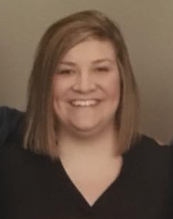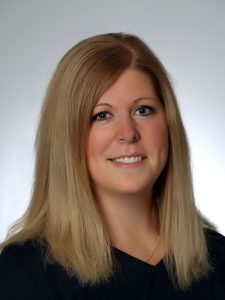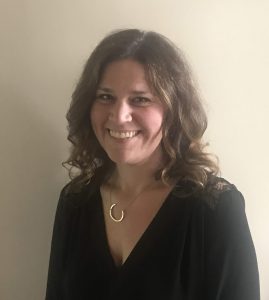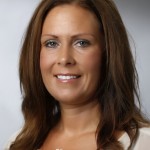Uncategorized
Faculty Spotlight: Heidi Waldschmidt, HCIS Adjunct Professor
What excites you most about Health IT?
The industry continues to change and challenges me every day. I enjoy the variety and like helping organizations transform their operations by better leveraging technology.
What are employers looking for when hiring for this field?
Connection to the industry – staying active in local and national chapters of HIMSS, HFMA, AHIMA, or other relevant industry groups. And an added bonus — these are great ways to network with potential employers!
What are the two most important skills a candidate can have?
A learning mindset — many of us, myself included, do not have extensive clinical backgrounds yet we’re working in an industry supporting workflows and technology needs of clinicians. Be open to learning new skills and perspectives of the customers you work with to strike a balance between health care and technology.
Ability to innovate — There are major challenges facing organizations and employers are looking for individuals who are willing to put forth creative solutions to complex problems.
What trends do you see or anticipate?
Health care organizations by now have generally made their move to electronic health records. These are huge investments for organizations so now we are seeing more health IT work shift to optimizing systems currently in place vs. projects to completely swap out technologies.
Why do you like teaching Health IT?
I enjoy being able to share my experiences working in Health IT with students and hearing the perspectives students bring to discussion. Talented Health IT professionals are in high demand so teaching in this program is important to the industry’s future.
As a Lead Consultant at Cerner Corporation, Heidi Waldschmidt is focused on all aspects of Revenue Cycle Health IT projects at the largest non-profit health system in the country. She makes an impact on clients by helping achieve their organizational goals through adoption of Cerner’s recommended workflows, content and capabilities.
Heidi joined Cerner in 2012 as a Senior Analyst in Revenue Cycle Consulting. She has held roles with the company such as Solution Architect and Intellectual Capital Strategist. During her time at Cerner, Heidi developed Cerner’s Revenue Cycle Playbook, an integral piece of Cerner’s best practice strategy. Heidi collaborates with multi-disciplinary teams across Cerner to ensure solutions enhance clinical and business practices. Prior to joining Cerner, Heidi spent two years at St. Francis Health Center in Topeka working in financial operations.
Heidi is a graduate of the University of Kansas Medical Center with a Master of Health Services Administration and earned a Bachelor of Arts in Human Biology from the University of Kansas.
Faculty Spotlight: Cindie Cipolla, HCIS Adjunct Professor
What excites you most about Health IT?
I am encouraged and excited to see the many career paths created via JOBS and OCCUPATIONS that result from the Health IT field. Health IT continues to be a growing industry. We are fortunate to have excellent employers in the KC area who need qualified workers.
What are employers looking for when hiring for this field? Employers are looking for applicants who can effectively work in a team environment as well as applicants that have healthcare IT skills.
What are the two most important skills a candidate can have? Computer skills and the the ability to work in a team environment that encourages knowledge sharing.
What trends do you see or anticipate? Blockchain systems and Artificial intelligence
Why do you like teaching Health IT? Having participated in the first JCCC HITECH class, which led me to work in the healthcare industry, it is important to me that students understand the various HITECH jobs and career opportunities that are available.
We have excellent large teaching hospitals that are ranked high in the areas of cancer treatments, heart and transplant surgeries. Thus, expertise is needed in the healthcare IT field in order to support the ongoing and future advances in healthcare. I enjoy sharing my on the job healthcare experiences working with application implementations including “go-lives”, workflow design and analysis and training. I hope to provide students with a better idea of the vast jobs or roles that are needed, to support the IT healthcare structure. The opportunities are vast here in the KC area!
Faculty Spotlight: Amanda Kraus, MIRM Department Chair and Associate Professor
What excites you most about Health IT?
What I love about Health IT is the combination of clinical and technical aspects. Understanding the needs of the healthcare team, and being able to put them into action is not only exciting, but rewarding.
What are employers looking for when hiring for this field?
Employers look for people who commit to continuing education, are adaptable – to new technologies, new groups of users, etc., are problem-solvers, and have excellent interpersonal communication skills.
What are the two most important skills a candidate can have?
Communication and customer service are key! We are generally the first line of defense for a frustrated user. Regardless of whether that user is the CMIO or a CNA, the issue they are experiencing is affecting their functionality. Being customer-focused and communicating with them every step of the way will reduce their anxiety, even if the problem can’t be resolved immediately. Early on in my career, the phrase “delight your customers,” was passed-around my facility, and has always stuck with me. Be the person end-users hope to hear on the other end of the line when they call the Help Desk, or the system administrator that meets with the department to understand their workflow and make changes to an ill-functioning process. There are many talented Health IT professionals; set yourself apart with excellent communication and customer service!
What trends do you see or anticipate?
I anticipate AI to be at the forefront of Health IT for quite some time. The benefits it may offer to all aspects of healthcare are yet to be fully-determined. With this also come the potential pitfalls – what are the legal ramifications of AI? What rights do patients have with this technology? These conversations are just getting started – I highly suggest you stay up-to-speed on this discussion!
Why do you like teaching Health IT?
Health IT is constantly evolving, and offers endless opportunities for learners (of all ages and professional experience) to expand their knowledge. Being a positive part of that process for my students, and helping them to realize their fullest potential, is one of the best contributions I can make to the industry.
Amanda Kraus graduated from the University of Kansas with a B.S. in Health Information Management. She is RHIA-certified through the American Health Information Management Association (AHIMA). Amanda spent 14 years at Saint Luke’s Health System, beginning in HIM as a student intern, and ending in Information Technology as a system administrator and project lead for a variety of applications, including the EHR, dictation/transcription system, RIS/PACS, and document imaging. She began teaching full-time at JCCC in the fall of 2016, and is now a professor and department chair for the Medical Information & Revenue Management department.
JCCC / USM Transfer Agreement
Faculty Spotlight: Cindy Lingerfelt, HCIS Assistant Professor
What excites you most about Health IT?
What I love about Healthcare and Information Technology is that there are so many opportunities to make a difference. Every day is a challenge as it relates to adapting to changes in the industry which I view as new opportunities to make a positive impact. I truly feel that we are on the cutting edge of what we can do in the HIT industry.
What are employers looking for when hiring for this field?
Aside from good soft-skills with the HIT knowledge and skills needed for this industry. Employers are looking for those with the desire to constantly learn and the flexibility to take on a problem and work toward a common goal on a team.
What are the two most important skills a candidate can have?
Communication is so very important, both verbal and written. Your communication skills are how others perceive you. You truly only get one chance to make that first impression so this skill is key. Additionally, adaptability is also important. HIT is constantly changing, a candidate whom is able to adapt to change and embrace it with a positive attitude will go far.
What trends do you see or anticipate?
Although we are starting to witness Machine Learning in HIT currently, I anticipate major growth in this field. Machine Learning could make it possible for virtual care thus expanding access to care especially in rural areas. Machine Learning can also be used in many various ways to assist care providers such as analyzing images, and providing better diagnoses and treatment plans.
Why do you like teaching Health IT?
I love teaching HIT as I truly feel I make a difference. I’m not a care provider, but I am equipping others to be able to provide care providers with tools to make better decisions for their patients. I look forward to teaching individuals how they can make a positive impact on healthcare and quality of care.
Cindy Lingerfelt is a graduate of Kansas State University. Cindy spent over 13 years working in the HIT industry at Cerner where she was a Solution Architect in the Laboratory and Radiology space. Cindy then moved into the learning and training area and was responsible for the onboarding of the software engineers. Cindy is now a Professor at Johnson County Community College in the Health Information Systems department where she prepares students for success in the HIT field.
HIMSS Virtual Career Expo (FREE)
Virtual Career Expo (FREE)
Connect one-on-one with global employers at the 2019 HIMSS Virtual Career Expo on Wednesday, October 30, 2019, 12:00 pm – 3:30 pm ET. Whether you’re looking to break into the industry or you’re an established professional, the HIMSS Virtual Career Expo has something for you.
- Explore employers and career opportunities for every stage of your career.
- Discover career development resources and interactive content in virtual employer booths.
- Engage directly and privately with employers via dynamic one-on-one web chats.
- Make new connections and broaden your network.
- Access archived job openings up to 30 days after the event.
Don’t miss your best chance to find your next career opportunity at the 2019 HIMSS Virtual Career Expo.
Free HIMSS Webinars
I Graduated….Now What? Emerging Career Opportunities Outside of Acute Care
Wednesday, September 11 | 11:00am CT|12:00 pm ET
Join us for our next presentation of our Early Careerists webinar series on Wednesday, September 11 to expand your perspective on emerging roles in the exciting field of health information and technology outside of the acute care setting. | Learn more
Workforce Development Trends and Opportunities
Wednesday, September 25, 2019 | 11:00am CT | 12:00pm ET
Details will be provided on the wide variety of roles available in the market today, where the industry is headed, and the skills and knowledge that are sought after. Tips on how to take advantage of these trends in your career and positioning yourself properly will be highlighted. | Learn More
Faculty Spotlight: Lori Brooks, HCIS Department Chair and Associate Professor
What excites you most about Health IT?
Healthcare IT is a fast-growing industry … one that is considered the ‘place to be’. It is ever-changing, requires constant education and, best of all, it is changing healthcare for the better.
What are employers looking for when hiring for this field?
Problem solvers, quick learners, active listeners, and those with a balance of technical skills, the oh-so-important soft skills and an understanding of healthcare processes.
What are the two most important skills a candidate can have?
Interpersonal skills that allow you to interact effectively with others and being an engaged problem solver in an ever-changing environment.
What trends do you see or anticipate?
Unlike some speculation, I believe AI technologies will enhance and not replace human efforts in healthcare. I also see the continuous push for patient-centered care meaning more personal access to care. With personal access comes an even larger acceptance of telehealth and the technologies that deliver care on a 24/7 basis.
Why do you like teaching Health IT?
Our country has invested billions of dollars into healthcare to achieve better patient outcomes and improve the quality of care. Because technology plays such a vital role in healthcare, healthcare IT looks to be a key tool in realizing these goals. Thus, the field continues to grow and change … making it ‘the place to be’.
After 9 years in secondary education, Lori Brooks entered the field of healthcare information systems as the Clinical Content Manager for Pulse Systems, Inc. where she focused on clinical documentation design while concurrently managing multiple clinical content implementations. Lori went on to work as the EHR Specialist for College Park Family Care Center, a large multi-specialty practice, where she was responsible for developing, supporting and maintaining all clinical aspects of the company’s EHR system. Most recently, she is a Professor and Department Chair at Johnson County Community College in the Health Information Systems department where she trains students for career advancement in the Healthcare IT field.
Lori earned her CPHIMS certification in 2016 and is recognized as a Senior Member of HIMSS (SHIMSS) for her service, professional participation, job experience, publications and presentations in the field of Health IT.
Resume Tips
6 Things to Immediately Delete Off Your Resume
By: Angie Balman
Goal of a resume: present your professional side to hiring managers and highlight why they should hire you.
Here are 6 things you should immediately remove from your resume.
1) An unprofessional e-mail address:
Still using your rebellious or cute e-mail address from high school? Time to change it! E-mail is often your first correspondence with hiring managers. An unprofessional e-mail at the top of your resume is an immediate turn-off. Also, if currently employed, do NOT use your current company e-mail!
2) Bland/Boring verbs/phrases:
For example, do not start every sentence with, “I was responsible for…” these statements are bland. You should be focusing on your achievements! Try looking up resume verbs to help spice it up a bit.
3) Clichés:
Like bland and boring phrases, clichés are overused and only help water down your resume. Highlight the unique skills and experience you bring to the table. Avoid phrases like “team player,” “hard working,” “dedicated,” “detail-oriented,” “people person,” etc.
4) Experience that is too old or irrelevant to the position you’re applying for:
Experience that is more than 15 years old is unnecessary, as is information not pertinent to the job to which you are applying. These waste space that could be used to highlight your recent and relevant experience!
5) Grammar/Spelling errors:
We are all human and spelling and grammar mistakes easily happen. However, your resume is a professional document, and should be free of these errors. Make sure to check and double check your resume. It may be helpful to have a friend or mentor edit it for you too!
6) “References available upon request:”
Yes, the hiring manager knows. This statement is not useful and is just a waste of a line. Use this space for something impactful.
Note: It is important to remember that less is more on your resume. Remove these things weighing down your resume and allow your accomplishments to truly shine!
Transferable Skills
Transferable Skills
Angie Balman
Starting over in a new career field can be scary, and the prospect of returning to school to learn something new can seem overwhelming. Rest assured, even though you may not have previous experience in the career field you’re looking to enter, you likely have skills that can help you be successful.
If you’re thinking about giving a health care a try, start by identifying skills that would transfer well into this field and thinking about the kind of work you would like to be doing.
Transferable skills Continue reading




